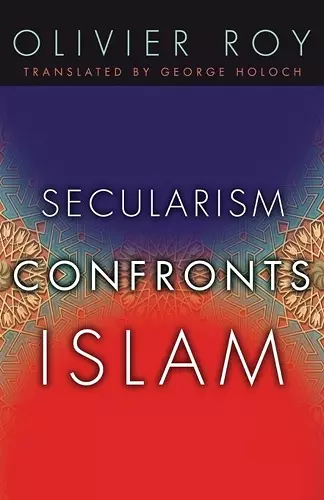Secularism Confronts Islam
Olivier Roy author George Holoch translator
Format:Hardback
Publisher:Columbia University Press
Published:20th Jul '07
Currently unavailable, and unfortunately no date known when it will be back

The denunciation of Islamic fundamentalism has slowly evolved into an attack on all Muslims and Islam. This hostility is rooted in the belief that Islam cannot be integrated into secular and liberal society. However, as Olivier Roy makes clear, Muslim intellectuals have made it possible for Muslims to live concretely in a secularized world while maintaining the identity of a "true believer." They have formulated a language that recognizes two spaces: that of religion and that of secular society.Western society is unable to recognize this process, Roy argues, because it assumes religious practice is embedded within a specific, traditional culture. Instead, Roy shows that new forms of religiosity, such as Islamic fundamentalism and Christian evangelicalism, have come to thrive in posttraditional, secular contexts precisely because they remain detached from any cultural background. In recognizing this, Roy recasts the debate concerning Islam and democracy. He distinguishes between Arab and non-Arab Muslims, hegemony and tolerance, and the role of the umma and the sharia in Muslim religious life. Supporting his arguments with extensive research, Roy demonstrates the limits of our understanding of contemporary Islamic religious practice and the role of Islam as a screen onto which Western societies have projected their own identity crisis.
The denunciation of fundamentalism in France, embodied in the law against the veil and the deportation of imams, has shifted into a systematic attack on Muslims and Islam. This book makes clear that Muslim intellectuals have made it possible for Muslims to live concretely in a secularized world while maintaining the identity of a true believer.The denunciation of fundamentalism in France, embodied in the law against the veil and the deportation of imams, has shifted into a systematic attack on all Muslims and Islam. This hostility is rooted in the belief that Islam cannot be integrated into French--and, consequently, secular and liberal-society. However, as Olivier Roy makes clear in this book, Muslim intellectuals have made it possible for Muslims to live concretely in a secularized world while maintaining the identity of a "true believer." They have formulated a language that recognizes two spaces: that of religion and that of secular society. Western society is unable to recognize this process, Roy argues, because of a cultural bias that assumes religious practice is embedded within a specific, traditional culture that must be either erased entirely or forced to coexist in a neutral, multicultural space. Instead, Roy shows that new forms of religiosity, such as Islamic fundamentalism and Christian evangelicalism, have come to thrive in post-traditional, secular contexts precisely because they remain detached from any cultural background. In recognizing this, Roy recasts the debate concerning Islam and democracy. Analyzing the French case in particular, in which the tension between Islam and the conception of Western secularism is exacerbated, Roy makes important distinctions between Arab and non-Arab Muslims, hegemony and tolerance, and the role of the umma and the sharia in Muslim religious life. He pits Muslim religious revivalism against similar movements in the West, such as evangelical Protestantism and Jehovah's Witnesses, and refutes the myth of a single "Muslim community" by detailing different groups and their inability to overcome their differences. Roy's rare portrait of the realities of immigrant Muslim life offers a necessary alternative to the popular specter of an "Islamic threat." Supporting his arguments with his extensive research on Islamic history, sociology, and politics, Roy brilliantly demonstrates the limits of our understanding of contemporary Islamic religious practice in the West and the role of Islam as a screen onto which Western societies project their own identity crisis.
A work of sustained deconstruction, [Roy] takes apart the myths, cliches and prejudices which characterise the current conversation about Islam. The Economist [A] brilliant little book. -- Philip H. Gordon Foreign Affairs A remarkable book: articulate, original, lucid, without a paragraph that fails to contain an interesting thought. -- Claire Belinski New York Sun [A] valuable little monograph. -- Martin Levin Globe & Mail Roy provides a useful corrective to the interpretation of Islamism. -- John Gray Harper's Superb... a welcome contribution to political science, sociology, religious studies--and statecraft. Choice [A] cogent work. Middle East Journal An insightful analysis. -- Talip Kucukcan Insight Turkey Rich in theoretical analysis. American Journal of Islamic Social Sciences
- Winner of Choice Outstanding Academic Title 2008
ISBN: 9780231141024
Dimensions: unknown
Weight: unknown
144 pages